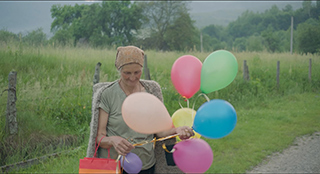Three Women
Drei Frauen- GERMANY / 2022 / Ukrainian, German / Color / DCP / 85 min
 Director, Script, Producer: Maksym Melnyk
Director, Script, Producer: Maksym Melnyk
Photography: Florian Baumgarten, Meret Madörin
Editing: Jannik Eckenstaler
Mixing: Roman Pogorzelski
Production Company: Film University Babelsberg KONRAD WOLF
Source: Film University Babelsberg KONRAD WOLF
The village of Stuzhytsia, nestled in a valley of the Carpathian Mountains, Ukraine. The director, returning to his home country to finish his graduate school film, meets three women who live there. Nelya, a biologist who spends each day collecting arthropods, goes about her work without regard for the camera. Maria, a postal worker handing out pension funds to the villagers, accompanies the director and cinematographer to various villagers’ homes. At first, Hannah, a farmer who raises cattle alone, lobs curses at the camera and refuses to be filmed, however unexpectedly things change. In a village where people are forced to choose between a livelihood in the land they know and abroad, these women have chosen to stay. The film is woven out of their steadfast way of life, in multiple layers that follow the fabric of the changing seasons. (KH)
[Director’s Statement] A few years ago I came to the village of Stuzhytsia in the Ukrainian Carpathian mountains where I met the biologist Nelya. I asked her what her scientific aim was. She said, “I am looking for bear feces.” I was surprised and asked why. “Because it is the most valuable thing in the world”—she answered with great excitement and explained how important it is for animal protection and research. That is how our story started . . . Later on, I met the farmer Hanna and the postmistress Maria. Each of the three women had a different story to tell, but at the same time the three women are similar in a way: all of them have certain strength and resilience, all of them have a remarkable sense of humor and irony that fascinated us.
We spent one year in this small village filming the life there. We drank a lot of coffee in the tiny summer kitchen of Hanna. We brought pensions to the villagers together with the postmistress Maria. We searched for the bear feces with Nelya in the woods. We wanted to make a film about the human encounters, the warmth that keep us together in cold winters in the mountains. We did not notice that we ourselves became a part of the community and at some point, it was very painful for us to leave.
During the post-production of the film, the war broke out in Ukraine. The movie has become a tribute to the peace in Ukraine, to the life which has changed forever after the war broke out.
 Maksym Melnyk
Maksym MelnykBorn in Uzhhorod, Ukraine. After working as a journalist for a regional TV studio in Ukraine, he started studying film direction at Academy of Performing Arts in Bratislava, Slovakia. He continued his studies at the Konrad Wolf Film University of Babelsberg, where he majored in documentary film direction. Other works include Schönborn (2020) and Bikes for Poroschkowo (2019). This is his first feature film.
